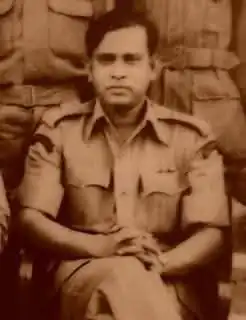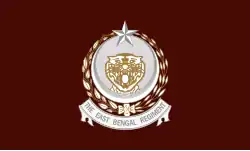Abdul Waheed Chowdhury
Senior Tiger Abdul Waheed Chowdhury | |
|---|---|
 Officer Commanding 1st East Bengal Regiment | |
| Birth name | Abdul Waheed Chowdhury |
| Nickname(s) | A. W. Chowdhury |
| Born | February 1, 1914 Dariapur, Habiganj, Sylhet |
| Died | February 18, 1965 (aged 51) Dhaka |
| Buried | Mariam Saleha Mosque Cemetery, Babupura, Dhaka |
| Allegiance | |
| Branch | Pakistan Armed Forces |
| Years of service |
|
| Rank |
|
| Service number | IEC-527 |
| Unit | |
| Commands | |
| Battles / wars | |
| Awards | Burma Star War Medal 1939-45 |
Major Abdul Waheed Chowdhury[1][2][3] (1914–1965) also known as Major A.W.Chowdhury was a senior Bengali military officer in the British Indian Army he was a World War II veteran soldier and later joined Pakistan Army.After the Partition of India and Independence of Pakistan in 1947 during that transition he was working as General Staff Officer at Supreme Commanders Headquarters , Pakistan and Indian Army joint Defense Council in Delhi,India.He played a crucial role in formulating the Pakistan Army and was instrumental in establishing the East Bengal Regiment.Major A.W.Chowdhury was the first Officer Commanding or Acting Commandant of 1st East Bengal Regiment.[4]
Early life and education
Major Chowdhury was born on 1 February 1914, in Dariapur village, Habiganj District, Sylhet Division. His father, Khan Sahib Abdur Rab Chowdhury, was the controller of examinations at Dhaka University.[2]Major Chowdhury completed his matriculation in 1931 from the Nabakumar Institution in Dhaka and later passed the intermediate examination from Dhaka College in 1933. He obtained a B.A. (Honors) in economics from Dhaka University in 1935 and completed his master's degree in 1937.[2]
Career
Major A W Chowdhury joined the British Indian Army and he received training at the British Indian Military Academy, Dehradun. As World War II broke out, he was commissioned as a Second Lieutenant in the 4th Madras Regiment ( now Punjab Regiment Pakistan) of the British Indian Army on 15 May 1941.[2] During the war, he served under General Sir Edward Quinan in the British 10th Army stationed in Basra, Iraq. Later, he joined the British 10th Army's headquarters in Ceylon (now Srilanka) and, after its dissolution, served with the 1st Punjab Regiment , Zhob Brigade under Brigadier Malik Mohammad Munir Khan Tiwana as Brigade DAA & QMG in Multan.[2]

During the partition while he was serving in the Supreme Commanders Headquarters in Delhi at the Infantry Directorate of the Pakistan Cell, he played a crucial role in formulating the Pakistan Army[2] and he was instrumental in creation of East Bengal Regiment.He was transferred to Rawalpindi, where he was involved in formulating Pakistan's military training doctrine. During the Indo-Pakistani War of 1947-1948, he was entrusted with the formation of the East Bengal Regiment, laying the foundation for the Senior Tigers.[2] In November 1947, Major A W Chowdhury raised the proposal to Field Marshal Claude Auchinleck of the necessity for an Bengali major infantry regiment for East Bengal. As a result, the East Bengal Regiment was given approval by Joint Defense Council and Supreme Commander Field Marshal Claude Achinlek .Head of State & Government of Pakistan Governor General Muhammad Ali Jinnah.[2] inaugurated East Bengal Regiments raising sermons on 15 th February 1948. Major Abdul Waheed Chowdhury was first to command , raise and see its initial training.[2] The Bengali's all across the defense forces of Pakistan faced discrimination in the center from West Pakistani Army officers to the chagrin of ethnic Bengali Army officers.[2][4]
Death
Major A W Chowdhury passed away on 18 February 1965, at his residence on Nazimuddin Road, Dhaka, at the age of 51. He was interred at the Mariam Saleha Mosque graveyard in Babupura, Dhaka.[2]
References
- ^ Abdul Haq, Colonel Mohammad (August 2022). Six Stars of Military History. Dhaka: Khoshroz Kitab Mahal Limited. pp. 258–280. ISBN 984-438-250-5.
- ^ a b c d e f g h i j k লড়াকু বাঙালি মেজর এ ডব্লিউ চৌধুরী [Fighter Bengali Major A. W. Chowdhury]. Daily Naya Diganta (Editorial) (in Bengali). Archived from the original on 2022-01-31. Retrieved 2022-05-06.
- ^ ইস্ট বেঙ্গল রেজিমেন্ট ও ভাষা আন্দোলন [East Bengal Regiment and the Language Movement]. Daily Naya Dignanta (Opinion) (in Bengali). Archived from the original on 2020-02-23. Retrieved 2023-05-17.
- ^ a b "The myth of martial race: Seared into a schoolboy's memory!". The Daily Star. 2021-04-19. Archived from the original on 2023-09-22. Retrieved 2025-02-27.